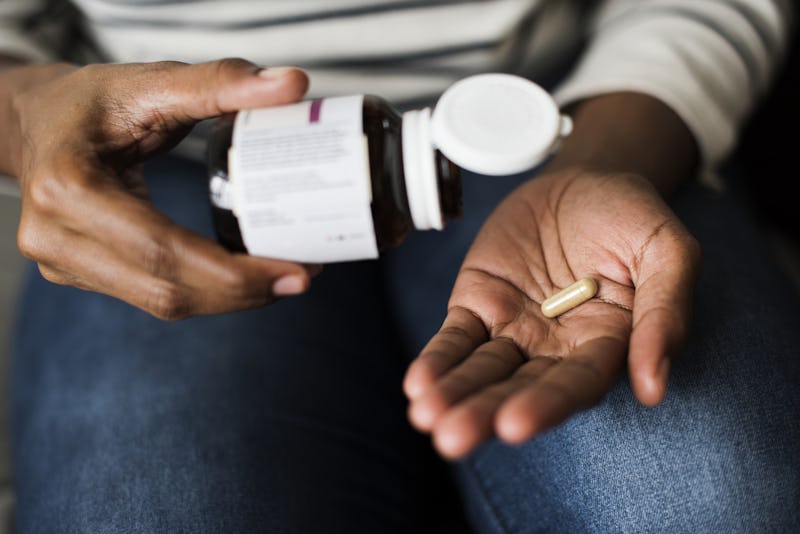Flu Shot Vitamin C
Life
4 Supplements To Take When You Have The Flu & 2 To Avoid

Rawpixel.com/Fotolia
During cold and flu season, most of us just want to huddle under the covers with Netflix, a box of tissues, and enough flu medication to build a small castle. If you like to go the supplements route to boost your recovery, be aware that supplements for the flu can be helpful, but they can also have unexpected side effects. There are several different types of flu, and dozens of supplements that purport to be able to cure every sniffle and sneeze. Some, however, are a bad idea; they probably won't do anything, or worse, they can interact with other medications. Other supplements may provide some relief but aren't proven to do more than that. And it's important to remember that once you start feeling flu symptoms and taking supplements for them, you're already moving through the flu cycle towards health again.
"Natural" remedies for flu have been around for thousands of years, from raw onions to hot honey and ginger tea. Just because something's touted as all natural, though, doesn't mean that it's going to be effective against a viral infection that's already fighting your immune system. There's nothing better for flu-fighting than the flu vaccine, but if you've already gotten yours and you're still down with the bug, you should read up on the supplements that can and can't make you feel better.
Zinc Might Interfere With Medication
The National Institute of Health warns that zinc, often marketed as a natural supplement for people suffering from cold and flu symptoms, might have the unexpected consequence of interfering with other medications. The Mayo Clinic notes that experiments have shown zinc seems to help a bit with cold symptoms, but that they also interfere with antibiotics — a serious problem if your flu becomes a bacterial infection.
Vitamin C Is Fine, But Won't Work Miracles
As far as supplements go during flu season, vitamin C is one of the best bets around. Science has shown it's at least partially effective in relieving flu symptoms. A study in 2017 found that doses of it could reduce the duration of the common cold, a minor form of respiratory infection, but other studies, including one in 2013, have found it tricky to find out if the vitamin might help prevention or treatment in any real way. If you happen to be on medication that contains amphetamine, vitamin C will also make it less effective.
Vitamin D Might Be Helpful For Prevention
Multiple studies in 2017 revealed that vitamin D supplements appear to show real promise as a way to prevent contracting colds and flu. It's thought vitamin D might have some kind of supportive effect on the immune system. One study, conducted in the UK, recommended that people should start using vitamin D supplements early in cold and flu season to fortify their immune response for respiratory infections. It's not clear if it helps shorten treatment generally.
Echinacea Might Help, But Be Careful About Allergies
Some Probiotic Supplements Show Minor Effects
One area of emerging science when it comes infections like the flu is how the gut affects the body's immune system. Early studies suggest that some kinds of probiotics might help some people deal with flu symptoms a little better. A small study in 2008, for instance, found that yeast-based supplements might help some flu patients, while another study in China found that several probiotic yogurts appeared to ease flu symptoms in people with compromised immune systems who fell ill a lot. The science on this is far from conclusive, though, and it's not widespread enough to be agreed upon.
But No Supplement Is Anywhere Near As Good As The Flu Shot
If you want comprehensive prevention, the only supplement to your health you should really focus on during cold and flu season is the one provided by the flu vaccine. It's updated yearly to target the particular flu strains that are expected to be most common, and is effective and safe.
Vitamin C and echinacea might prove to be soothing, but for genuine action against the flu virus, it's the vaccine every time. If you're able to get the flu shot, it's important to do so for the sake of those who aren't able to, whether because they are pregnant, young, elderly, or otherwise immunocompromised. On top of this, practicing good hygiene throughout the season — washing hands and staying home if you feel a sickness coming on — can help prevent this disease from spreading.
Source: https://www.bustle.com/p/supplements-for-the-flu-can-be-helpful-but-be-aware-of-these-interactions-12279301
